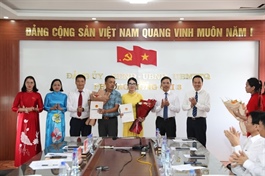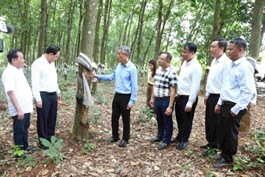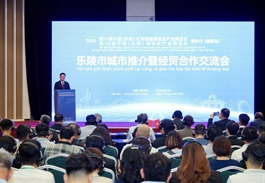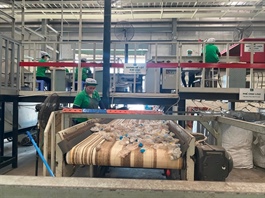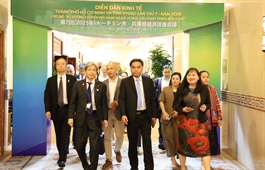Vietnam advances in ASEAN sustainability reporting shift
Vietnam advances in ASEAN sustainability reporting shift
Vietnam is taking deliberate action to align its corporate sustainability reporting practices with international frameworks, as regional momentum builds to meet investor expectations, manage climate risks, and strengthen corporate transparency.
A new report by the Association of Chartered Certified Accountants (ACCA) highlights the need for ASEAN nations to take a more active role in shaping global policy and standard-setting in sustainability reporting.
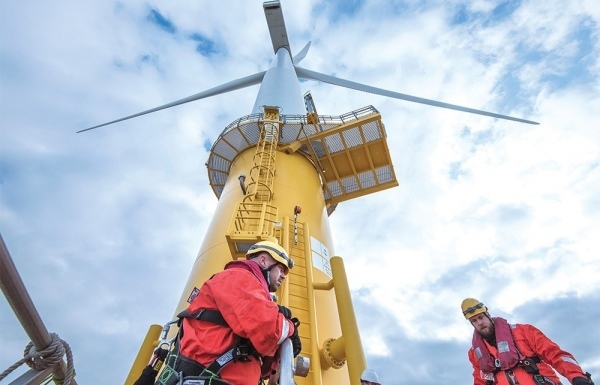
A recent ACCA study highlighted persistent gaps in how companies account for carbon-related instruments |
Launched on July 28, the report offers a comprehensive overview of ASEAN’s regulatory readiness to adopt globally aligned, decision-useful sustainability disclosures. It outlines challenges across the region and provides recommendations to support the transition to the International Sustainability Standards Board’s (ISSB) global baseline. ASEAN nations such as Indonesia, Malaysia, the Philippines, Singapore, and Thailand have already begun aligning with the framework.
“ASEAN is expected to be the fourth-largest economy by 2030. It already serves as a key global value chain partner. Yet, it is also a region that is likely to face significant interlinked risks in the future from climate, nature or social dimensions,” Sharath Martin, senior policy consultant at ACCA and lead author of the report, told VIR.
“Encouragingly, many ASEAN economies have announced plans or signalled intent to align with ISSB standards. This reflects a positive commitment towards a common global baseline, while recognising the need for proportionality. ASEAN therefore deserves and should advocate for a seat at the table of global policymaking on sustainability reporting in order to reflect the needs of its businesses and governments,” Martin added.
Heightened exposure
Vietnam, in particular, stands at a transitional point in its sustainability reporting journey. Though the country has yet to mandate full adoption of the ISSB or equivalent standards, its regulatory framework has been evolving.
In 2015, the Ministry of Finance provided guidelines on financial and non-financial reporting, including environmental, social, and governance (ESG) disclosures. This was later expanded in 2020, making sustainability reporting mandatory for all publicly listed firms.
Efforts to promote ESG transparency have also been reinforced by the State Securities Commission, while the Ho Chi Minh Stock Exchange has introduced voluntary ESG reporting templates. A number of large firms in the banking, energy, and real estate sectors now use frameworks such as the Global Reporting Initiative and the Task Force on Climate-related Financial Disclosures. However, coverage remains uneven.
According to the ACCA report, only 69 per cent of Vietnam’s top 100 listed companies disclosed sustainability data in 2024, down from 87 per cent in 2022. Biodiversity reporting remains especially weak, with fewer than 20 per cent of companies including such content – despite Vietnam’s heightened exposure to climate and environmental risks.
The report warns that failure to keep pace with global standards could carry significant implications for Vietnam’s export-oriented economy. Mechanisms such as the EU’s Carbon Border Adjustment Mechanism and the Corporate Sustainability Reporting Directive are poised to impact exporters in carbon-intensive sectors. Without harmonised disclosures, companies may face greater compliance costs and diminished access to key markets.
To address this, the ACCA recommends a building-blocks approach that allows countries to adopt the ISSB framework as a core baseline, while adding localised disclosure requirements. This approach is designed to ensure consistency for international investors while accommodating domestic capacities, especially for small and medium-sized enterprises.
“This report comes at a pivotal moment for ASEAN,” said Pulkit Abrol, director of ACCA Asia-Pacific. “As the region accelerates towards becoming the world’s fourth-largest economy, the way we account for sustainability must evolve just as quickly. We see professional accountants as catalysts, not just for compliance, but for building trust, guiding decision-making, and driving sustainable growth.”
The report provides the technical foundation needed to support ASEAN’s shift towards ISSB alignment while championing proportionality and local relevance, Abrol added.
Beyond standards, the report identifies capacity building as an essential enabler. Governments, accountancy bodies, and universities are urged to invest in training professionals in sustainability reporting, ESG assurance, and risk management. For Vietnam, where ESG literacy remains limited, these efforts are viewed as critical to preparing companies for future regulatory requirements.
The report also suggests establishing national sustainability intelligence platforms, centralised databases where businesses can access benchmarks and disclosure tools. Such platforms would help smaller businesses comply with ESG requirements and assist policymakers in tracking progress towards climate and biodiversity targets.
Public commitments
As ASEAN economies move closer to adopting global sustainability standards, another study released by the ACCA on July 30 highlights persistent gaps in how companies account for carbon-related instruments, an increasingly important issue as both voluntary and compliance carbon markets continue to develop.
The study, on the reality of accounting for carbon-related instruments and jointly published by the ACCA and the Adam Smith Business School at the University of Glasgow, reviewed the financial statements of 300 companies across 46 jurisdictions operating in high-emitting sectors. The findings point to inconsistencies and limited transparency in how carbon credits, allowances, and certificates are reflected in financial reports.
Although many of the reviewed companies have publicly committed to net-zero targets, fewer than half made any reference to carbon-related instruments in their financial statements. Where disclosures were provided, accounting treatments varied significantly, ranging from classification as intangible assets or inventory, to no recognition at all.
The study raises concerns about a potential disconnect between climate-related operational activities and financial reporting.
In several cases, information on carbon credit usage or offsetting appeared in sustainability reports, but was not included in audited financial statements.
“Carbon credits and emission allowances are playing an increasingly central role in the climate strategies of companies worldwide,” the report stated. “Yet the financial implications of these instruments remain poorly understood, and current accounting practices fall short of supporting credible, comparable, and decision-useful disclosures.”
A key issue highlighted by the report is the absence of a unified accounting framework. In some instances, companies recognised carbon credits only upon settlement, limiting the visibility of these instruments’ financial impact over multiple reporting periods.
The authors call for standard-setting bodies, particularly the International Accounting Standards Board and the International Auditing and Assurance Standards Board, to accelerate efforts to develop clear guidance on the treatment of carbon-related instruments.
Auditor involvement was also found to be limited. Even in cases where carbon instruments were disclosed, the study noted a lack of evidence regarding detailed audit review, pointing to potential gaps in audit readiness and professional expertise.
The report further highlights the importance of capacity building across the financial ecosystem. It recommends targeted training and technical guidance for accountants, auditors, and regulators to ensure they can apply existing and emerging standards effectively. It also supports closer alignment between sustainability disclosure frameworks, such as those issued by the ISSB, and traditional financial reporting standards.
While the report provides a global perspective, its findings carry particular relevance for emerging markets, including Vietnam. The country is currently in the early stages of establishing a domestic carbon market, as outlined in a 2022 decree on greenhouse gas mitigation and ozone layer protection. Pilot trading schemes are scheduled to begin this year, with a full market rollout planned for 2028.
- 14:08 12/08/2025








